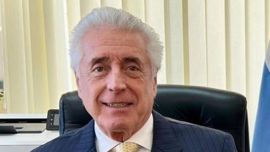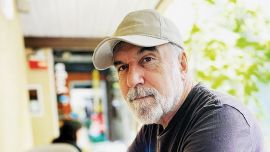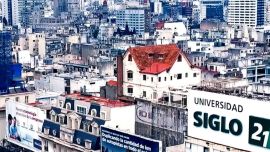The recent so-called “Gestapo” case collects several of the worst characteristics that constitute the Argentine socio-political-economic system. On the one hand we have a serious scumbag who abused his power as a union leader to enrich himself and torment the business community, which ultimately led to a dramatic reduction in construction activity in the city of La Plata, the capital of Buenos Aires Province. On the other, we have an administration that earned its right to govern the region – and the Nation – while wrapped in the robes of Republicanism and respect for institutions, yet which relied on illicit collusion between the state, the Judiciary, the intelligence services and others to persecute its political opponents. And finally, we have the current administration, which won an election with the promise of a centrist president who would reduce polarisation, using the Federal Intelligence Agency (AFI, the current incarnation of the intelligence services) to leak compromising material on its political rivals at key moments to mask their incompetence after two years in office.
A video from 2017 was leaked to the press after AFI trustee Cristina Caamaño – a Kirchnerite – presented it to a judge in La Plata to be evaluated as potential evidence of wrongdoing during the governorship of María Eugenia Vidal. In that video, the ex-governor’s labour minister, Marcelo Villegas, tells a group of business leaders, public officials (including the mayor of La Plata at the time) and a couple of AFI spies that: “If I could have a Gestapo, a shock force to finish off all of the trade unions, I’d go ahead.” Furthermore, Villegas invites the group to bring legal cases against the trade unionists noting the Judiciary, including the Attorney General, were ready to cooperate. The main target was Juan Pablo ‘Pata’ (“the Foot”) Medina, head of the Workers Union for the Construction of the Argentine Republic (UOCRA) in La Plata.
“The Foot” was a pretty big crook who had come to be feared by the business community in La Plata. He had amassed a nice little fortune by the time he was detained. According to reporter Emilia Delfino, writing for Perfil at the time, Medina owned seven properties including one in the exclusive beach town of Cariló, a speedboat, several pickup trucks and luxury vehicles. In the 2016 voluntary tax amnesty regime (known as the ‘blanqueo’) set up by the Mauricio Macri administration, he declared funds worth some eight billion pesos, or close to US$570 million at the time. Through his control of the union, ‘the Foot’ literally controlled the construction business in the city, forcing developers to fork over hundreds of millions of pesos in order to build and operate in La Plata. His biggest business appears to have been catering where companies operating in the city were forced to buy luncheon services from Abril Catering, El Rey del Cielo, and Mejor que en Casa which were directly or indirectly controlled by the Medina clan. Just in 2017 alone they clocked in revenues estimated at nearly 100 million pesos. State owned energy giant YPF was the main client, but every company had to pay to play, including Paolo Rocca’s Techint, Contreras Hermanos, BTU, Esuco, Skanska, and Panedile, to name a few. Medina was ultimately accused of illicit association, extortion and corruption, and detained after having bunkered down in the union’s headquarters and allegedly threatening to “burn down the Province of Buenos Aires” if the police came for him. He finally handed himself in at his residence, where Gendarmerie agents found him smoking a narguile pipe.
Yet despite all this, Medina’s criminal background is no excuse for putting together a working group tasked with putting him behind bars while relying on unconstitutional and illegal collusion between the provincial government and the Judiciary. In a recent television interview, Vidal claimed that the video footage showed a normal work meeting, in an official government office, in the light of day, and that it included officials from her government working with the private sector. Asked repeatedly why AFI spies were there, she said it was the agency’s responsibility to explain that in court. Furthermore, she pointed to the fact she herself was spied on by the Macri administration’s AFI, alleging that the tape was illegally recorded. Still, that doesn’t make it OK for her labour minister to suggest he’d like a Gestapo or note he had judges ready to go.
This latest scandal also shines a light on the Kirchnerite maxim of dubbing the Macri administration a “nest of rats” that used the Judiciary, the intelligence services and its relationship with certain mass media organisations to persecute political leaders. Not only did that Macri administration actually engage in said behaviours, it left a boatload of evidence behind. Cristina Fernández de Kirchner and some other former government officials who are being investigated for corruption use this as an opportunity to whitewash their crimes, putting together the theory of “lawfare.” What for them is a continental and systematic plan against progressive leaders, orchestrated by financial interests in the “Imperial” United States, is nothing more than Latin America’s political pendulum at work, together with weak institutions. Cristina and her acolytes abused the Judiciary to rid themselves of problems during their tenure while aggressively pursuing opponents. Unfortunately, Macri’s Cambiemos coalition followed in their exact same footsteps despite having won the 2015 presidential elections and 2017 midterms on an anti-corruption platform.
Thus, it brings together the second Kirchner administration, Macri’s four years in government and President Alberto Fernández current term in that all three of them have relied on the “dark basements of democracy” for political gain. In his inaugural speech, Alberto claimed he would eliminate the collusion between crooked governments, a dirty judiciary and the sketchy intelligence agencies. He knew, though, that his political leader’s main preoccupations had to do with corruption investigations directly against her and her family. Throughout his government, federal judges have progressively freed former Kirchnerite officials from behind bars (including Medina), cleared Cristina or desisted from pursuing certain ongoing cases, and gone on the offensive against Macri.
Argentina’s ‘Foots’ are an essential part of its development problem, as is a crooked and partial justice system and the use of the state for party politics and revenge. Vidal, who seemed to have good intentions and a clean background, will not emerge unscathed from this issue.






















Comments